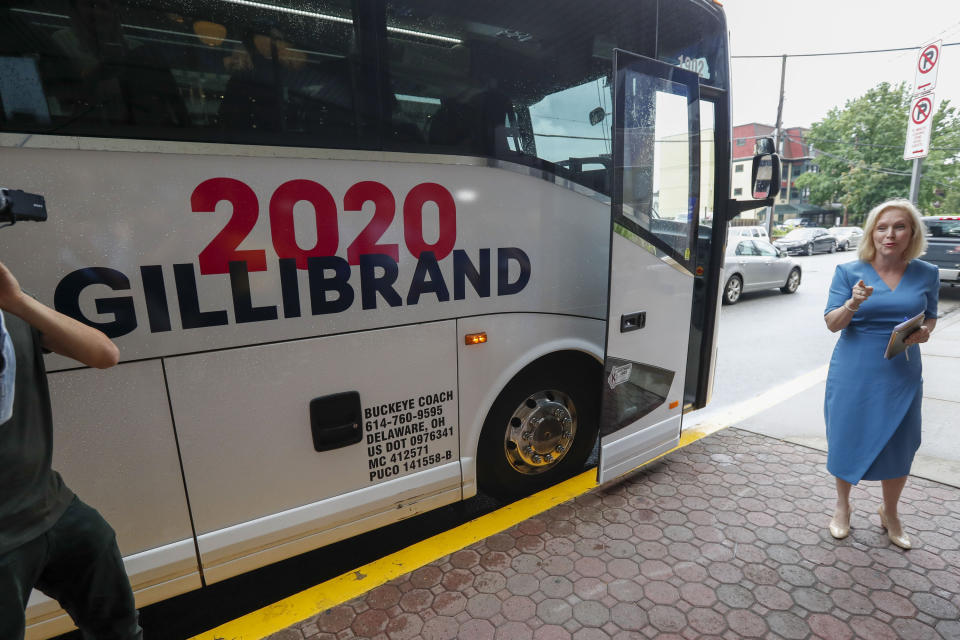How to kill health insurers
Kirsten Gillibrand didn’t raise her hand on July 27 when a debate moderator asked 10 presidential candidates who wanted to get rid of private health insurance. But that’s the outcome she favors, all the same.
Gillibrand, a Democratic senator from New York, backs a “Medicare for all” program that would cover all Americans, similar to the Bernie Sanders and Elizabeth Warren plans. But she wouldn’t force people out of the private insurance system. Instead, she’d let anybody join Medicare, if they wanted to, and force insurance companies to compete for patients with the giant government program.
“If they want to compete, let them lower their rates,” Gillibrand told Yahoo Finance recently from her New Hampshire campaign headquarters. “Let them cover more stuff. I dare them to compete. I doubt they will.”
If Gillibrand is right, millions of Americans would willingly give up private insurance and join Medicare instead, paying premiums lower than what private insurance would cost. That would send insurers into a kind of death spiral: As they lost patients they’d have to raise premiums to cover an ever-shrinking pool of people, and rising premiums would send more and more people into Medicare. The end result would be a de-facto single-payer health care system driven by consumer choice rather than government fiat. Private insurers would go out of business because they couldn’t match Medicare on quality and price while also turning a profit.
Gillibrand and others contend that private-sector health care firms can never be as cost-effective as a government program, because of the profits they must earn for shareholders and the millions they must pay CEOs and other top executives. Yet the scenario could unfold quite differently if Congress ever did expand Medicare eligibility to the entire U.S. population.
A winning campaign line
For-profit insurers have a powerful incentive to be as efficient as possible—while the government doesn’t—and it’s possible they could beat Medicare on price and quality of service while still turning a profit. For-profit firms FedEx and UPS compete with the US Postal Service in package delivery, and they hardly find themselves outclassed. The Postal Service, meanwhile, loses money every year and is chronically dogged by inefficiency and political interference.

Employers would also play an important role if there were a new public health care option, since they’re the source of coverage for nearly half of all Americans. A new program that drew people away from employer-provided coverage would cause acute problems for employers, since they, too, would face a worsening financial burden if health care plans became more expensive. Insurance coverage is an important slice of employee compensation, and there would be sudden gaps in compensation if some workers got insurance from the company and some didn’t. That alone might make such a system unworkable. Other “public options” would only be open to people who couldn’t get affordable coverage through an employer, in order to keep the existing system—which works reasonably well—intact.
Still, Gillibrand and many other Democrats may have a winning campaign line when they say corporate profits are incompatible with affordable health care. “The problem with the insurance industry is their first obligation is to their shareholders, not their patients,” she says. “So they'll make decisions all the time that are not in your best interest.”
Better health care is a top concern for voters heading into the 2020 election, and Democrats feel they’ve got a major advantage over President Trump and his fellow Republicans, who have no real plan except to repeal the Affordable Care Act. But many Democrats, including front-runner Joe Biden, feel it’s important to leave private insurance in place instead of funneling everyone into something like Medicare for all. For all their flaws, health insurers have a few reluctant supporters.
Rick Newman is the author of four books, including “Rebounders: How Winners Pivot from Setback to Success.” Follow him on Twitter: @rickjnewman
Confidential tip line: rickjnewman@yahoo.com. Encrypted communication available. Click here to get Rick’s stories by email.
Read more:
How Joe Biden avoided Hillary Clinton’s Wall Street problem
The Democrats need better villains
The Trump trade war is far from over
Everybody running for president is rich
Elizabeth Warren’s best and worst economic ideas
Medicare for all won’t work. This might
Read the latest financial and business news from Yahoo Finance
Follow Yahoo Finance on Twitter, Facebook, Instagram, Flipboard, SmartNews, LinkedIn, YouTube, and reddit.
